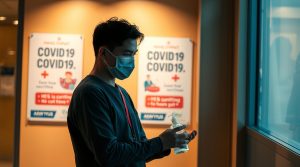
As the world continues to navigate the ongoing challenges of the COVID-19 pandemic, it remains essential for individuals to take precautions to protect themselves and others. While vaccines and preventive measures have significantly reduced the severity of the disease, the virus is still circulating in many regions, and new variants can emerge unexpectedly. To ensure safety during this time, it is important to stay informed and follow the necessary guidelines to minimize the risks.
Follow Public Health Guidelines
The first and most important step in staying safe amid COVID-19 is to follow the guidance provided by health authorities such as the World Health Organization (WHO) and local public health departments. These guidelines often evolve based on the current situation, so it is crucial to stay updated on the latest recommendations. Public health guidelines typically include wearing masks in crowded or enclosed spaces, practicing physical distancing, avoiding large gatherings, and washing hands frequently.
While restrictions may vary depending on the region, staying informed about local policies and staying compliant with them can help reduce the spread of the virus.
Get Vaccinated and Stay Up-to-Date with Boosters
One of the most effective ways to protect yourself from COVID-19 is through vaccination. Vaccines have proven to be highly effective in preventing severe illness, hospitalization, and death caused by the virus. Many countries have rolled out vaccines to the public, and it is essential to get vaccinated as soon as you’re eligible.
Moreover, COVID-19 variants may affect vaccine efficacy over time, which is why booster doses are recommended for added protection. Stay up to date with the latest vaccination recommendations, including booster shots, to ensure continued immunity against emerging strains of the virus.
Practice Good Hygiene
Proper hygiene is a key preventive measure in reducing the transmission of COVID-19. Frequent handwashing with soap and water for at least 20 seconds is essential, especially after being in public spaces, touching surfaces, or coughing and sneezing. If soap and water are not available, use hand sanitizer containing at least 60% alcohol.
In addition to hand hygiene, it is important to clean and disinfect commonly touched surfaces such as doorknobs, light switches, and smartphones regularly. These practices can help reduce the spread of germs and reduce the risk of coming into contact with the virus.
Wear Masks When Necessary
While mask mandates may differ depending on where you live, wearing a mask remains a simple but effective way to protect yourself and others from COVID-19. Masks help prevent the spread of respiratory droplets that may carry the virus, especially in crowded indoor spaces or areas with poor ventilation.
Even if you are fully vaccinated, wearing a mask can add an extra layer of protection when in public spaces, particularly in areas with high transmission rates. Opt for high-quality masks such as N95 or KN95 for optimal protection, especially in environments where the risk of exposure is higher.
Maintain Physical Distancing
Physical distancing continues to be a key measure in preventing the spread of COVID-19. Staying at least 6 feet away from others in public places, especially in crowded settings, can minimize the chance of airborne transmission. Avoiding crowded indoor spaces, such as restaurants, theaters, and events, is also crucial to reduce the risk of exposure.
If you must go to indoor spaces, choose well-ventilated areas, and limit the duration of your stay. Whenever possible, opt for outdoor activities where the risk of transmission is significantly lower.
Monitor Your Health and Get Tested Regularly
If you experience symptoms such as fever, cough, shortness of breath, or fatigue, get tested for COVID-19 immediately. Even if you don’t have symptoms but have been exposed to someone who tested positive, it is important to get tested and self-isolate until results are received.
Regular testing is particularly important if you’re traveling, attending large events, or working in high-risk environments. Testing helps detect infections early, preventing the further spread of the virus.